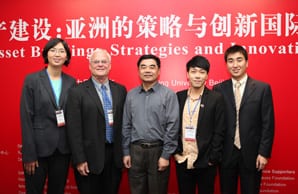Asset building policy is rapidly increasing throughout Asia in response to rising inequality and aging populations. 
The Center for Social Development at Washington University in St. Louis partnered with Peking University and Hong Kong Polytechnic University to host a conference on strategies and innovations for asset building. This conference, held at Peking University in mid-November, reviewed research on asset building initiatives, a growing interest throughout Asia.
“The conference enabled stakeholders in the Asia Pacific region to share knowledge and lessons and build a network of policy makers and professionals advancing asset building in Asia and beyond,” said ZOU Li, CSD international director.
Conference topics included national policies, home ownership, savings for children and youth, social entrepreneurship, asset-building innovations, and policy diffusion.
More than 100 international and Chinese conference attendees heard a keynote address about the “role of home ownership in East Asian social policy” from James Lee of Hong Kong Polytechnic University. Lee described how home ownership can lead to improved individual welfare and security, potentially resulting in more adequate funds for retirement.
Several speakers discussed research and policies in their home countries, citing both triumphs and challenges. HAN Chang-Keun of Sungkyunkwan University in South Korea, described asset-based policies that have been expanded in his country over the past decade. “These expansions suggest that asset-based policies may enable disadvantaged groups to help themselves and achieve social development,” HAN observed.
One section of the conference was dedicated to Singapore, using that country as an example of asset-building policy. Presenters described the innovative policies that are in place and how those have changed over the years.
Conference participants also learned about policies and initiatives in China, Sri Lanka, Malaysia, Vietnam, Taiwan and Indonesia, as well as research studies and programs in Thailand, Nepal, China and Mongolia. Sharad Sharma of New Era in Nepal presented initial findings on how Nepalese youth have responded to savings accounts in the YouthSave project, which provides savings products targeted to low-income youth in Nepal, Colombia, Ghana and Kenya. CSD leads the learning agenda in YouthSave.
Another child savings presentation focused on the Hong Kong Child Development Fund, a policy informed by CSD research. The Child Development Fund was launched in 2008 and offers a combined territory-wide matched savings plan, one-to-one adult-adolescent mentoring, and supervised personal development plans. “The program is meant to address the intergenerational transmission of poverty,” said project leader Charles Chan. “Participants have positive attitudes and behaviors toward life-goal planning. Reciprocal and mutual trust between mentor and mentee are found to have a significant impact on adolescent psychosocial development.”
The conference garnered extensive media coverage in China, including articles in high-profile news outlets such as China Youth Daily, Sina News, China Daily, ifeng,com and NetEase (163.com). Peking University News wrote an extended story, and China Social Sciences published a long story about the conference on its front page. The media coverage has helped spread news of this topic to wider audiences, expanding the conversation about asset-building innovations.
LIU Zheng, general director of the Department of Social Work in the Ministry of Civil Affairs, articulated the significance of this conference for the people of China, saying, “Asset building policies and programs will bring great benefits to our citizens, and this gathering will only help in moving our work forward.”
Five Washington University McDonnell International Scholars Academy institutions were represented at this conference: Peking University, Fudan University, National Taiwan University, University of Hong Kong and National University of Singapore. In addition, two McDonnell Scholars wrote papers for the conference. Wimonmat Srichamroen, who received her master of social work degree in 2011 from Washington University’s Brown School, spoke about a child savings program she has helped to implement in Thailand. JIN Minchao is currently working toward his PhD in social work at the Brown School. His joint paper with Professor ZHAO Deyu of Fudan University, “Social policy innovations on land use in rural China: An asset-based analysis,” was presented during the conference.
Co-organizers of the conference were Peking University, Department of Sociology; National University of Singapore, Centre for Social Development (Asia); and China Association for Social Work Education. The conference was supported by the Levi Strauss Foundation, Keswick Foundation, Ford Foundation, and Washington University in St. Louis, McDonnell International Scholars Academy.
“Washington University in St. Louis is proud to partner with Peking University, Hong Kong Polytechnic University, National University of Singapore, and others in organizing this conference. With aging populations in many countries, building assets over the life course will be fundamental for both economic development and security in old age,” said James Wertsch, vice chancellor for international relations and director of the McDonnell International Scholars Academy.
Before the conference ended, discussion was already taking place about next steps to increase asset building capability in Asia. Publications relating to this conference will include a Chinese book published by Peking University Press, as well as an English book and a special issue of the “Chinese Journal of Social Work,” published by Taylor & Francis in the United Kingdom.
Michael Sherraden, Center for Social Development director and Youngdahl professor of social development at the Brown School, noted that several countries in Asia have created innovative policies and programs that build assets for family and community development. “All of this experience can inform innovations in the United States and elsewhere. It seems likely that universal and progressive asset-based policies will play a larger role in many countries in the years ahead.”